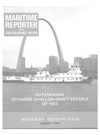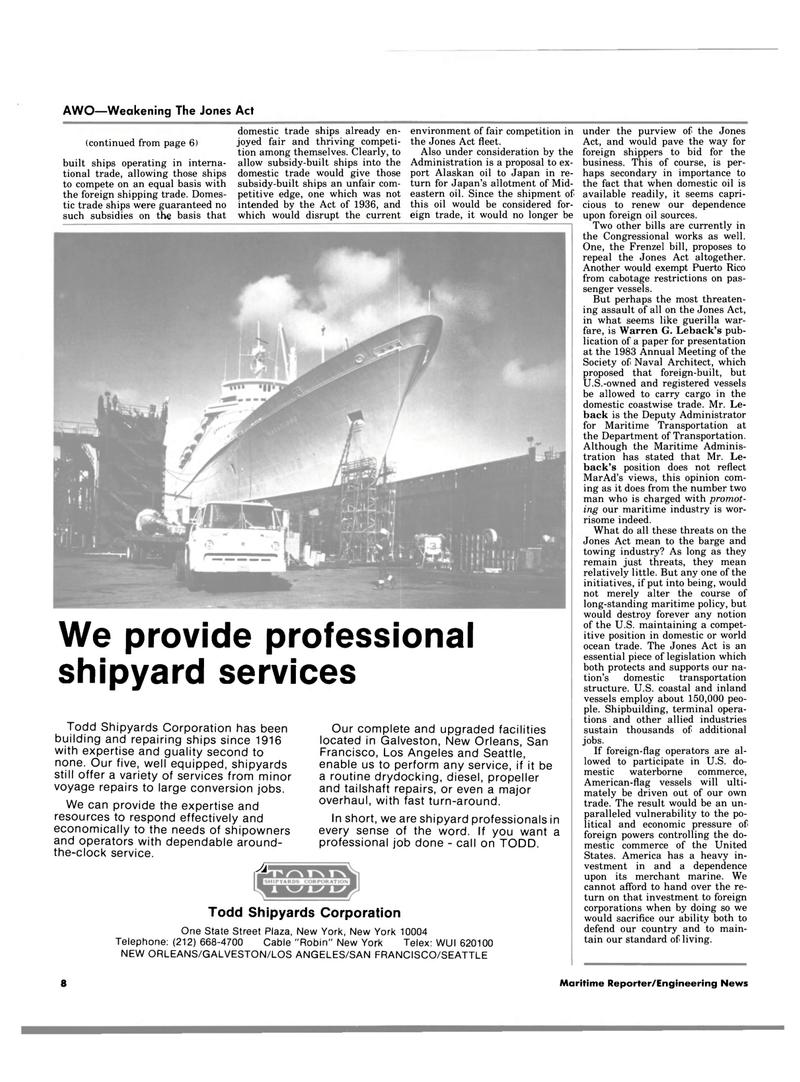
Page 6: of Maritime Reporter Magazine (January 1984)
Read this page in Pdf, Flash or Html5 edition of January 1984 Maritime Reporter Magazine
AWO—Weakening The Jones Act (continued from page 6) built ships operating in interna- tional trade, allowing those ships to compete on an equal basis with the foreign shipping trade. Domes- tic trade ships were guaranteed no such subsidies on the basis that domestic trade ships already en- joyed fair and thriving competi- tion among themselves. Clearly, to allow subsidy-built ships into the domestic trade would give those subsidy-built ships an unfair com- petitive edge, one which was not intended by the Act of 1936, and which would disrupt the current environment of fair competition in the Jones Act fleet.
Also under consideration by the
Administration is a proposal to ex- port Alaskan oil to Japan in re- turn for Japan's allotment of Mid- eastern oil. Since the shipment of this oil would be considered for- eign trade, it would no longer be
We provide professional shipyard services
Todd Shipyards Corporation has been building and repairing ships since 1916 with expertise and guality second to none. Our five, well equipped, shipyards still offer a variety of services from minor voyage repairs to large conversion jobs.
We can provide the expertise and resources to respond effectively and economically to the needs of shipowners and operators with dependable around- the-clock service.
Ja
Our complete and upgraded facilities located in Galveston, New Orleans, San
Francisco, Los Angeles and Seattle, enable us to perform any service, if it be a routine drydocking, diesel, propeller and tailshaft repairs, or even a major overhaul, with fast turn-around.
In short, we are shipyard professionals in every sense of the word. If you want a professional job done - call on TODD.
Todd Shipyards Corporation
One State Street Plaza, New York, New York 10004
Telephone: (212) 668-4700 Cable "Robin" New York Telex: WUI 620100
NEW ORLEANS/GALVESTON/LOS ANGELES/SAN FRANCISCO/SEATTLE under the purview of the Jones
Act, and would pave the way for foreign shippers to bid for the business. This of course, is per- haps secondary in importance to the fact that when domestic oil is available readily, it seems capri- cious to renew our dependence upon foreign oil sources.
Two other bills are currently in the Congressional works as well.
One, the Frenzel bill, proposes to repeal the Jones Act altogether.
Another would exempt Puerto Rico from cabotage restrictions on pas- senger vessels.
But perhaps the most threaten- ing assault of all on the Jones Act, in what seems like guerilla war- fare, is Warren G. Leback's pub- lication of a paper for presentation at the 1983 Annual Meeting of the
Society of Naval Architect, which proposed that foreign-built, but
U.S.-owned and registered vessels be allowed to carry cargo in the domestic coastwise trade. Mr. Le- back is the Deputy Administrator for Maritime Transportation at the Department of Transportation.
Although the Maritime Adminis- tration has stated that Mr. Le- back's position does not reflect
MarAd's views, this opinion com- ing as it does from the number two man who is charged with promot- ing our maritime industry is wor- risome indeed.
What do all these threats on the
Jones Act mean to the barge and towing industry? As long as they remain just threats, they mean relatively little. But any one of the initiatives, if put into being, would not merely alter the course of long-standing maritime policy, but would destroy forever any notion of the U.S. maintaining a compet- itive position in domestic or world ocean trade. The Jones Act is an essential piece of legislation which both protects and supports our na- tion's domestic transportation structure. U.S. coastal and inland vessels employ about 150,000 peo- ple. Shipbuilding, terminal opera- tions and other allied industries sustain thousands of additional jobs.
If foreign-flag operators are al- lowed to participate in U.S. do- mestic waterborne commerce,
American-flag vessels will ulti- mately be driven out of our own trade. The result would be an un- paralleled vulnerability to the po- litical and economic pressure of foreign powers controlling the do- mestic commerce of the United
States. America has a heavy in- vestment in and a dependence upon its merchant marine. We cannot afford to hand over the re- turn on that investment to foreign corporations when by doing so we would sacrifice our ability both to defend our country and to main- tain our standard of living. 18 Maritime Reporter/Engineering News

 5
5

 7
7
